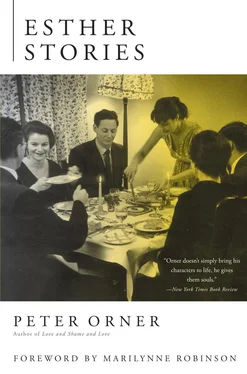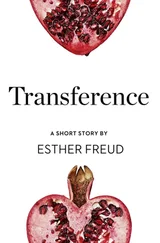One theory, a romantic one, is that things started to go wrong, horribly wrong, with my Aunt Esther after she was forced to break it off with Bo, a gentile, the only man she’d ever loved. (This last nameless Bo is always described as a gentile even though his not being Jewish was never an issue: the issue was that he had no prospects and he wasn’t going to college.) I’m not certain how my grandparents actually prevented my aunt from running off, but I assume (membership in this family for thirty-five years gives me at least this right) that they deployed a tried-and-true Burman tactic: psychological guerrilla warfare. Potshots from the hills under the cover of darkness. I can hear my grandmother muttering under her breath:… My opinion of course doesn’t mean a lick…only your happiness…never has…a mother’s burden to suffer this…children do what they wish …And of course in drops Lloyd Kantorowitz to the rescue! Some son of a friend of Mattie Rosenthaler’s. Handsome, modest, tall, ex-lieutenant, medical student. A faintly mustached man with long eyelashes and squinting, tentative eyes, all three characteristics bothering my grandfather so much that in later years he often growled that he knew Lloyd was a zero from one look at his mug.
I study an old high school picture of Esther and find it difficult to believe that the portly, angry, hollow-eyed woman who lived in my grandparents’ basement throughout the 1980s is this person who looks so much like Elizabeth Taylor in Cat on a Hot Tin Roof: seductive, sweaty, a little nasty, a little pouty. In this black-and-white photograph in the gold frame I found tucked away in my grandfather’s study, in a cabinet under his shelf of Civil War books, is someone I would have loved had I been there.
Not a surprise that at her funeral there were men like me to spare. Lonely grovelers who had known her back when. When she was Homecoming Queen of New Trier High School, when a single glance in your direction from Esther Burman in the slamming-locker halls was like being plucked from the masses by a long-fingered, just-widowed princess. Calling for you. Choosing you. And you pointing at your throat, confused and flushed, knowing she was making a mistake that would cut deep for years. A guy behind you or next to you, but never you. And her (the glance longer now, burning into your memory): Yes, you.
So she married Lloyd Kantorowitz in 1963, and Bo became a Burman family footnote. I first hear of all this from Olivia Hodges, my grandparents’ housekeeper of forty-five years, a woman I loved as much as my mother, a woman who used to sing out family secrets as willingly as she’d serve grilled peanut butter and marshmallow sandwiches to my friends and me after school.
One day Olivia told me this: His name was Bo, but he didn’t look anything like that stupid name. A short boy with crazy dirty hair. No taller than your father and very polite. Politer than your father ever was or is. From here but not from here here. (She made circles with her hand to let me know that he wasn’t from near the lake, that he probably grew up on the other side of the expressway. West.) Esther said he played guitars or drums or some other nonsense. He cleaned up at your grandpapa’s bank, and no way in God’s emerald heaven was your nana going to let Esther end up with a man who pulled wastebaskets and swamped toilets for a living. Esther didn’t take ballet and piano and those posture lessons from Cootie Thomas downtown so she could marry a janitor. Use your common sense, Leo. Esther was a jewel. I used to pin her hair every night. She wouldn’t let anybody else touch it. She wouldn’t even go to Lamont’s with your nana. But did she eat that boy up! Talked about him night and day. Dreamed about him. Woke up in the morning, and it was Bo jumped out of a plane, Bo got elected president. Lloyd was polite, but so shy. Not like Bo, who used to come around to the kitchen window and make faces at me, wiggling his mouth trying to reach his nose with his tongue. Then out of the clear blue sky she told him not to come around the house anymore, and she went down to Illinois for college. Lloyd, when he came in the picture, would look at his shoes when he talked to me, and I’m the maid and he’s the doctor. But handsome. Not a hair of a nose difference between Lloyd and Rock Hudson in the face except that Lloyd was going to be a doctor and your nana liked that better.
You can’t blame Lloyd for falling in love with Esther. Who wouldn’t have? Who didn’t? He was from Eau Claire, Wisconsin. A Jew from some little town in Wisconsin nobody in my family could ever pronounce correctly. You think he ever saw a girl like Esther Burman before? She was a freshman at the University of Illinois and still grieving over her sent-away Bo, when my grandmother, her best friend, Mattie Rosenthaler, and Mattie Rosenthaler’s friend (always unnamed, as though everyone refuses, out of principle, to remember this last link to Lloyd) conspired to introduce her to the young doctor-to-be on the Friday after Thanksgiving, 1962. Esther was a sorority girl, already treasurer of the chapter and only a first-semester freshman. (A girl dropped out and Esther leaped from pledge to officer.) Lloyd was in his third year of medical school at Northwestern. They met at a cocktail party in the house on Pine Point, in the living room. The big room with the matching black leather chairs and the long windows and the shaggy brown rug that I used to run my fingers through and pretend was the thick fur of a dead bear my grandfather shot. Petrified Lloyd made Esther laugh when he fumbled and then stepped backward on his wineglass. Together they knelt and bumped heads, Lloyd in the heat of his fifteenth apology. Then my grandmother and her friends descended upon the broken glass like crazy pecking pigeons. Clucking: It’s not your fault, Lloyd. Olivia keeps forgetting to dry off the stems. Olivia! Help us here! It’s not your fault, Lloyd!
The next Saturday Lloyd drove down to Champaign with a back seat piled high with violets and yellow roses and boxes of Fannie May chocolates. It became a regular date. Lloyd’s Saturday-afternoon drive down south. After driving three and a half hours without stopping, Lloyd would sprint up to the palatial oak door, each time as jittery as the first day he met her. Then he’d be ushered inside the forbidden palace, that nation-state of women. The front hall of that sorority house was every bit as grave as any European church he’d studied in high school. Flying buttresses. Vaulted basilicas. Carpets as thick and soft as a putting green. Curtains closed tight against the street like a funeral home. The house mother, fat and stubby, an elegant noose of pearls around her neck, standing behind the little embroidered couch in the waiting room, arms folded across her tremendous chest repeating, “We have rules in this house, Mr. Kantorowitz. Hard-and-fast rules concerning curfew.” Waving her chubby arms, nose crunched up as if she’s whiffing something putrid. “Get acquainted with these rules lest you find yourself permanently unwelcome at Sigma Delta Tau.” And then Esther would appear, a flutter of hair and unbuttoned buttons, the back of her dress floating behind her like a puffed sail, circling the couch, kissing Mrs. Roachwell, gushing, “Please don’t scare Lloyd, Mother. Can’t you see he’s scarable?”
I shake hands with Lloyd after Esther’s funeral service. He sucks his lower lip. He still has that smudge of mustache. He is still handsome. “Difficult day,” he says. His hand is moist and sticky, and he holds mine too long, trying to make up for the cowardice of his words. I nod, and both of us turn away to shake more hands. Later, I watch him as he stands alone. His second wife, also a doctor, stands nearby and talks to an elderly cousin of my grandmother’s, a woman in a jeweled hat named Simone. (Apparently she is French, but nobody has ever been able to explain why she’s related to us.) Lloyd’s new wife has heard only horror stories about Esther, but this is a funeral and she murmurs to Simone in a reverential hush. Cousin Simone yawns. She’s never liked my grandmother or her children, and this whole ordeal is starting to bore her. Lloyd stands close to the edge of the conversation, but he’s alone. Alone as the aged high school boys who will go home to their lipsticked wives and sigh, Rosalie, I still can’t get myself to believe that Esther Burman could die. I watch Lloyd watch the spot at the front of the room where the casket lay before the men from Pritzger’s loaded it into the hearse for the ride to the cemetery. Later, Lloyd and I will bump elbows as pallbearers when we help move Esther from the car to the grave. But now I watch him squint at the spot. His head quivers slightly. If she was gone before, where is she now?
Читать дальше












